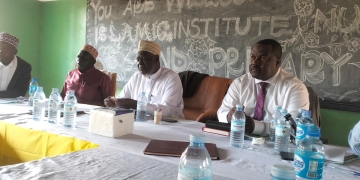
Kampala, Uganda — The United States Patent and Trademark Office has accepted on January 7, 2025. an application filed by the Founder and Managing Director of Dei BioPharma, Dr. Matthias Magoola, to secure exclusive rights to the invention of the world’s first universal vaccine against Foot and Mouth Disease (FMD), an infection that has been wreaking havoc in livestock across the country and other parts of the world. This invention, titled “Affordable Universal Fusion Universal Vaccine for Foot and Mouth Disease Infections,” will save the government billions of shillings it has been spending on importing vaccines.
Filing a patent gives an inventor the exclusive rights to their invention. This means that once you’ve patented an invention, no one else can make, use, or sell what you’ve created without your licensing.
In the accompanying documents, Dr. Magoola, hitherto a silent Ugandan scientist but whose leadership of Dei BioPharma Ltd, Uganda’s first research-based biotechnology and pharmaceuticals firm, has sprung his works to the spotlight, says the universal fusion vaccine combines the epitopes of all known epitopes of the viruses responsible for the disease and thus allows inducing cross-protection against all known serotypes and strains of viruses responsible for foot and mouth disease (FMD) to create a complete universal antigen.
The technology invented by Dr. Magoola is unique, as described in the patent: “In another embodiment, it is fused with a serum protein or to a small synthetic peptide that binds to a serum protein to extend the half-life of the antigen that is further connected to an adjuvant, when expressing the antigen using recombinant technology; in another embodiment, the present invention presents RNA technology, where the antigen is expressed through linear mRNA, circular RNA and both non-replicating and replicating to substantially reduce the cost of goods (COGS), bringing these vaccines within the affordable reach of the entire world,” the patent reads in part.
According to Dr. Magoola, there is no such product in the world, meaning that it will be a game changer in the fight against FMD and an opportunity for Uganda to provide a product that can be of great value to many developing country economies because of the low cost of production due to the novel design of the vaccine that requires only a minimal dose, compared to any other vaccine for any disease.
FMD is an acute systemic viral infection affecting food-producing animals, such as cattle, sheep, goats, swine, and other cloven-hoofed animals. Being highly contagious, FMD is one of the most serious diseases in the livestock industry, resulting in extensive productivity losses and impacting the economies of almost every country.
According to the patent, the FMD virus contains four structural proteins, VP1, VP2, VP3, and VP4, that form its capsid and are critical for its structure and infectivity.
“Among these, VP1 is the most extensively studied due to its significant roles in virus attachment to host cells, eliciting protective immunity, and determining serotype specificity. Its immunogenic properties make VP1 a primary target for developing peptide vaccines to provide specific and cross-serotype protection. In addition to the structural proteins, the virus has a group of non-structural proteins, including 2A, 2B, 2C, 3A, 3B, 3C, and 3D, which are essential for viral replication and intracellular functions,” it reads in part.
It adds that these non-structural proteins are instrumental in diagnostic assays designed to differentiate infected animals from vaccinated ones, a strategy known as DIVA (Differentiation of Infected and Vaccinated Animals).
Vaccinated animals typically produce antibodies against structural proteins, while infected animals generate antibodies against structural and non-structural proteins. This distinction is crucial for controlling and eradicating FMD through targeted vaccination.
“In one embodiment, the present invention provides a detailed procedure for formulating a universal vaccine capable of protecting against various serotypes and/or strains of FMD viruses,” the patent reads in part.
“In one embodiment, the present invention discloses a vaccine formulation capable of inducing cross-protection against different serotypes or strains of FMD viruses by (a) polynucleotides encoding peptides, polypeptides or proteins of the virus; (b) recombinant peptides, polypeptides or proteins of the virus; (c) peptides, polypeptides or proteins fused with serum proteins and (d) adjuvants to enhance the potency of the FMD vaccine,” it adds.
The patent further explains that the pharmaceutical combination comprising one or more vaccine formulations of the present invention has the advantage of generating immunogenic cross-protection with fewer vaccination campaigns.
“Extending the half-life of foot-and-mouth disease (FMD) antigens by conjugating them with serum proteins in cattle is a promising approach to improve vaccine efficacy and reduce dosing frequency,” it reads.
Between 2015 and 2019, Uganda reported 140 FMD outbreaks, with 111 of them occurring during the dry season. To control FMD, Uganda has a bi-annual vaccination programme that requires 44 million vaccine doses per year, costing around USD 176 million (approx. UGX. 800bn), according to Agriculture Minister Mr. Frank Tumwebaze. The government has also restricted the movement of livestock and livestock products occasionally to control the disease that affects even neighboring countries.
“We are also working with our neighbors in Tanzania to collaborate in the fight against FMD since it is a transboundary disease. The collaboration focuses on areas of synchronization of vaccination calendars and coordination between our veterinary authorities in the clearance of animal movement and disease surveillance across the border,” Minister Tumwebaze told Parliament on February 1, 2024.
This latest development marks another milestone for Dr. Magoola of Dei BioPharma Ltd, who the prestigious International Molecular Biologist Awards in December 2024 recognized for his contributions to vaccine research. Dr. Magoola was awarded the Best Researcher Award for his contribution and honorable achievement in innovative research with his emphasis on using mRNA technology to produce therapeutic drugs and protein vaccines after he authored a study titled “Advancing Therapeutic and Vaccine Proteins: Switching from Recombinant to Ribosomal Delivery—A Humanitarian Cause” which was published in the International Journal of Molecular Sciences, a highly peer-reviewed journal. The annual biochemistry and molecular genetics award recognizes a scientist whose molecular discovery has improved human health.
Dr. Magoola’s international awards:
Under the leadership of Dr. Magoola, Dei BioPharma, Uganda’s first research-based biotechnology and pharmaceuticals firm, has continuously won international innovation awards and was last year listed as the winner of the best pharma company at the African Excellence Awards, organized by MEA Markets, based in London, UK. Dr. Magoola has also been nominated and confirmed a full member of Sigma Xi, a prestigious society that brings top world scientists together.
Founded in 1886, Sigma Xi’s goals aim to honor excellence in scientific investigation and encourage cooperation among researchers in all fields of science and engineering.
Many of the world’s most influential scientists, such as Albert Einstein, Linus Pauling, Barbara McClintock, and Sally Ride, have been members of Sigma Xi.
Dr. Magoola, too, has been nominated by the Silicon Valley Review as one of the upcoming pharmaceutical CEOs to watch in 2025.
Dr. Magoola’s leadership and patents:
Dr. Magoola has led the Dei Group over the years to birth a portfolio of sub-companies across diverse sectors, including the current development of the flagship biological drugs and vaccines manufacturing facility in Mattuga, Wakiso District, in Uganda, being spearheaded by Dei Biopharma Ltd.
Its flagship product, the Dei Anti-Malarial drug derived from natural sources, had its active ingredient isolation process performed in the United States of America in the latest cutting-edge laboratories. It was confirmed to be the most efficient anti-malarial drug ever discovered; with a US patent, this will be the first new drug for malaria treatment.
Dr. Magoola’s first product was the COVID-19 vaccine that he developed using mRNA technology in the USA, and it is currently being kept in a cell bank in the USA and ready for introduction as the COVID-19 virus mutates to spread the disease.
Dr. Magoola has more than 100 patents filed in the USA for treating different diseases and vaccines, including cancer, HIV, Alzheimer’s, Malaria, TB, Diabetes, etc.
One of Dr. Magoola’s patents encodes darbepoetin, a therapeutic protein used for the treatment of acute kidney failure and cancer, using mRNA is the first such product in the world that has been submitted to the US FDA for approval review, and the FDA has taken great interest in advising Dr. Magoola how to bring this product to patients worldwide; such products form the future of biological therapies, and this success will lead to dozens of such products; the uniqueness goes farther since these products use the cutting edge mRNA technology that came into existence after the success of the Covid-19 vaccine; the most significant feature of this technology is the fast development, within weeks that takes years, and with a small fraction of cost; the cost to patients is also minimal, making this technology bring expensive biological drugs within reach of all patients across the world, as Dr. Magoola has described in his recent research paper. Dr. Magoola is not only using this technology but also teaching others to adopt it by providing technical details and advice—this is a humanitarian cause that Dr. Magoola broadly adopts.
Another product that Dr. Magoola has filed with the FDA is to rejuvenate the treatment of neurodegenerative disorders such as Alzheimer’s disease. He has published multiple papers describing how to ensure a drug enters the brain. This aspect was ignored in the drugs tested, failing to develop any treatment for these diseases. It is anticipated that in 2025, Dr. Magoola will fill clinical testing protocols with the FDA; given the dire need for such drugs, the FDA is promoting this under an emergency treatment program. These drugs comprise a market of USD 100+ billion. Dr. Magoola is also working on several other novel treatment approaches that will be announced soon.
The work of Dr. Magoola, as acknowledged in his research papers published in highly reputable scientific journals, the acceptance of his US patents, and the FDA’s advice to him to expedite the development of novel treatments is exemplary, demonstrating his focus on ensuring that the most respected regulatory agencies thoroughly wet his research.










